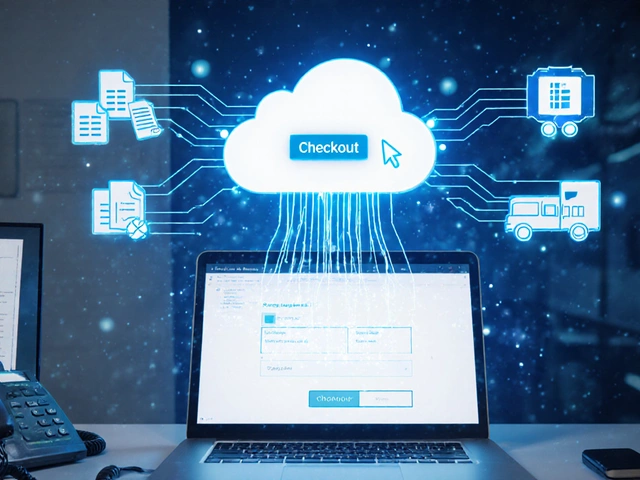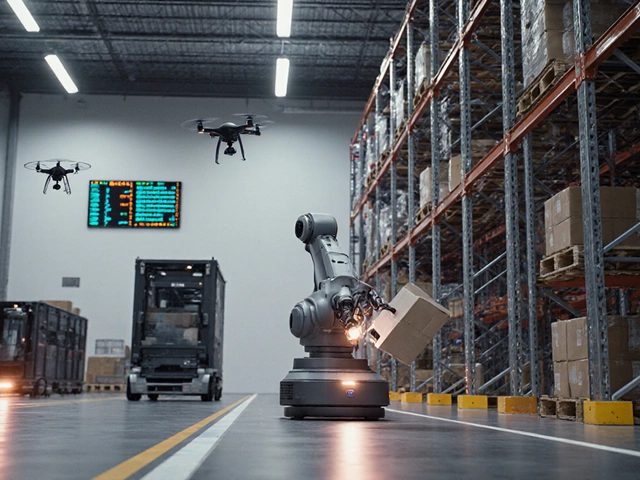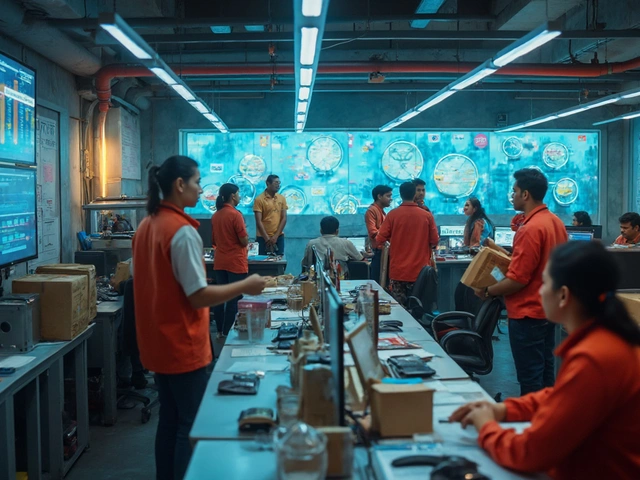Ever wonder if logistics is a good fit if you’re the type who groans at the idea of never-ending meetings? You’re not alone. Logistics is packed with behind-the-scenes roles where most of the real action doesn’t require being a social superstar.
I know a few planners and inventory managers who prefer spreadsheets to small talk. They spend their time organizing shipments, tracking supplies, and making sure packages end up where they’re supposed to—most of the job happens behind a screen or walking the warehouse, not in front of a crowd. The best part? Success in these roles often comes down to your attention to detail and your ability to solve problems quietly, not how loudly you can pitch yourself in the break room.
And here’s the kicker: logistics companies are hiring more remote workers than ever. So, if you’re more comfortable texting than talking, or you like to think first and speak later, logistics has a space for you. Some jobs do need you to chat with drivers or suppliers, but a lot can be managed by email or quick calls, not hour-long gab sessions.
- What Does Logistics Really Involve?
- Where Introverts Shine in Logistics Roles
- Work Environments: From Warehouses to Remote Desks
- Daily Challenges and How to Handle Social Stuff
- Tips for Thriving as an Introvert in Logistics
What Does Logistics Really Involve?
If you picture logistics as just moving boxes from one place to another, that's only scratching the surface. The world of logistics companies covers everything it takes to get stuff from point A to point B—sometimes across the street, sometimes across the globe. This whole system keeps businesses running and shelves stocked. It’s more about tight planning and fast problem-solving than tossing packages around.
Here’s what logistics jobs usually break down into:
- Inventory management: Keeping track of exactly what’s in the warehouse and when it’s time to reorder. This is a lot of checking numbers and updating digital systems, not just physical counting.
- Transportation planning: Figuring out the fastest, cheapest, and most reliable way to send goods. One day you’re working on truck routes; the next you’re setting up a shipment across the ocean.
- Order processing: Making sure the right items get packed, shipped, and delivered when—and where—they’re supposed to. Mess up here, and you’ll hear about it fast.
- Scheduling: Lining up trucks, workers, and warehouse slots so nothing sits idle and everyone knows what they’re supposed to be doing.
- Data and reporting: Pulling reports on deliveries, inventory, and problems so the company actually knows what’s going on behind the scenes.
Modern logistics relies a lot on technology. Most people in these roles use specialized software to track shipments, update orders, and coordinate with others. Here’s a quick look at how far tech shapes things these days:
| Task | Old Way | New Way |
|---|---|---|
| Inventory Count | Paper, clipboards | Barcode scanners, tablets |
| Route Planning | Printed maps | GPS apps, AI tools |
| Order Updates | Phone calls | Real-time tracking portals |
In short, logistics jobs are about moving information as much as moving things. If you’re into organizing, optimizing, or making a plan and sticking to it, there’s a spot for you in logistics—even if you don’t want to be front and center all the time.
Where Introverts Shine in Logistics Roles
If you’re an introvert, the logistics world actually opens up more doors than you might think. Lots of jobs focus on working with systems, numbers, or tech—not endless conversations. Let’s get into a few roles where introverts really stand out.
- Inventory Analyst: Most days are spent tracking numbers, managing databases, and making sure stock is in the right place at the right time. Communication is often just quick updates over email or a short team chat.
- Warehouse Coordinator: This job is less about face-to-face talk and more about making sure everything moves smoothly behind the scenes. You’ll set up schedules, monitor shipments, and troubleshoot any hiccups without constant interruptions.
- Data Entry Specialist: It’s the ultimate "heads-down" task. Data entry keeps supply chains running but doesn’t need a ton of teamwork or small talk—perfect if you thrive in quiet focus.
- Logistics Planner: Here, you’ll puzzle out routes, delivery times, and cost savings. Most of it you do solo, plugging away at the best ways to get stuff from point A to point B.
And here’s something cool: About 41% of logistics and supply chain roles reported in 2024 let employees work remote at least part time.
| Role | Level of Social Interaction (1-5) |
|---|---|
| Inventory Analyst | 2 |
| Warehouse Coordinator | 3 |
| Data Entry Specialist | 1 |
| Logistics Planner | 2 |
The lower the number, the less chit-chat and open office drama. So, if you want a solid job minus the small talk, logistics companies have more options than you’d guess.

Work Environments: From Warehouses to Remote Desks
Talking about logistics jobs, you can end up in all sorts of spots. Some folks are on warehouse floors, keeping an eye on inventory and making sure orders are packed right. These jobs can actually be pretty chill if you like working solo or in a small team. You won’t have to hustle through big group meetings or lots of customer calls.
Warehouse settings are usually more about doing than talking. There’s a lot of focus—counting, scanning barcodes, checking stock sheets. What matters is precision, not small talk. That’s why a lot of introverts find their groove here. Earbuds in, head down, focused on the job. And if you’re worried about safety or loud environments, most companies have clear guidelines and provide ear protection. Some warehouses rotate jobs, letting you move between picking, packing, or auditing—so it’s not the same routine every day.
But logistics companies have changed big time in the last few years. Now, a lot of paperwork and tracking that used to take place on-site happens on laptops. Remote work is booming, and companies like DHL and FedEx hire for remote dispatch, shipment tracking, and supply planning. You could work at home, chatting over Slack or Teams instead of shouting across a loading dock.
- Inventory coordinator: Can be done remotely or on-site, relying heavily on email, spreadsheets, and specialized software—perfect for people comfortable with solo work.
- Logistics analyst: Usually office-based or remote, crunching numbers, making reports, and solving problems with minimal face-to-face time.
- Warehouse associate: On the floor, with clear tasks and a straightforward workflow. Great if you want more hands-on, active hours with less talking.
Here’s a little breakdown of where people work in logistics, according to a 2024 survey by the International Warehouse Logistics Association:
| Work Setting | Percentage |
|---|---|
| Warehouse/On-site | 57% |
| Office-Based | 23% |
| Remote/Home | 20% |
If you like having your own space and working with clear steps and goals, logistics offers several paths—hardly any of them require being a people person all day long. Whether it’s sorting boxes or analyzing shipping data, you can choose what works best for your personality.
Daily Challenges and How to Handle Social Stuff
So let’s talk real life in logistics if you’re an introvert. The job isn’t just about moving boxes and tracking numbers—you’ll still have to deal with people. Some parts, like dealing with suppliers or drivers, might mean picking up the phone or joining a quick team meeting. That can be draining if you’re not into constant talking. You might also have to push back on delays or explain errors, which isn’t always comfortable if you like to avoid conflict.
But there are ways to make social situations work for you. Many logistics companies use email, instant messaging, or even dashboards for most conversations, so you get more time to think before you hit send. If you prefer your communication in writing, you’re in luck.
Now, it’s true that some warehouse and transport roles need direct instructions or group huddles at the start of the shift—that’s usually short and to the point. But in planning or analysis roles, a lot of updates can be shared digitally, and many introverts can structure their day to control when they do their social check-ins.
Here’s a quick reality check with some real stats from a 2023 career survey in the logistics field:
| Challenge | % of Workers Affected | Common Workarounds |
|---|---|---|
| Last-minute urgent calls | 28% | Use templates/scripts for responses |
| In-person meetings | 34% | Summarize points ahead by email |
| Unexpected schedule changes | 41% | Auto-reminders or setting buffers |
If social stuff trips you up, try these:
- Set up status updates by email or chat instead of in-person huddles when possible.
- Prepare scripts for tricky conversations. Even a simple, “I’ll need to check and get back to you” buys you thinking time.
- Block out quiet hours in your calendar for deep work. Most managers are cool with this if you hit your targets.
- Avoid multitasking during calls—take notes to keep focused and look confident, even if you’re nervous.
And remember, quiet problem-solvers are just as valued as loud go-getters in logistics.

Tips for Thriving as an Introvert in Logistics
It’s totally possible to carve out a successful path in logistics even if small talk drains you. The whole industry runs on planning, accuracy, and keeping things moving behind the scenes. Here’s how introverts can actually stand out—and feel good—on the job.
- Lean on tech and tools: Modern logistics companies run on software for inventory, shipments, scheduling, and more. Learn these systems inside and out. The better you know them, the less time you spend on unnecessary calls or in-person problem-solving.
- Use written communication to your advantage: Introverts tend to express thoughts more clearly in writing. If you’re not into spontaneous phone calls or meetings, suggest using email or chat for updates and feedback. Many companies are already used to this, especially with remote work taking off since 2020.
- Carve out focus time: Block off chunks of time to work without interruptions. Most supervisors in logistics care more about your output than how much you’re chatting. If you need quiet to concentrate, use your calendar to mark "do not disturb" hours.
- Choose roles that fit your style: Data analyst, inventory coordinator, procurement, and dispatcher are just some roles that have less face-to-face action and more problem-solving. Pick jobs that match your comfort zone and strengths.
- Work in bursts and recharge: Even in logistics, there are busy stretches—end of month, holidays, or big launches. Plan for downtime where you can recharge after long days. Even five-minute walks help.
- Set boundaries: If you find meetings overwhelming, ask for agendas in advance or for parts of discussions in written form. You can contribute thoughtfully without feeling put on the spot.
Here’s a quick look at areas where introverts usually thrive versus areas they might want to avoid:
| Great for Introverts | Usually More Social |
|---|---|
| Supply chain analysis | Sales support |
| Route planning | Customer service desks |
| Inventory management | Team or shift leading |
| Procurement research | Onboarding/trainings |
If you stick to these tips and play to your strengths, logistics can actually feel like a pretty good fit. Plus, with more automation and remote work, the space for introverts is only getting bigger.





